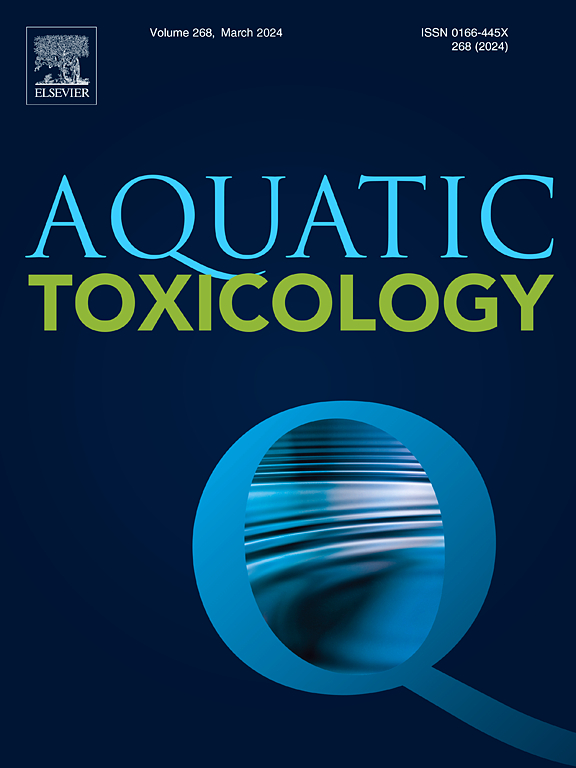斑马鱼对聚苯乙烯微塑料的免疫反应:通过ros驱动的NF-κB途径调节炎症反应(Danio rerio)
IF 4.1
2区 环境科学与生态学
Q1 MARINE & FRESHWATER BIOLOGY
引用次数: 0
摘要
人们对水生生态系统中微塑料(MPs)日益普遍的担忧日益增加。虽然MPs通过多种途径对鱼类产生毒理学影响,但其确切的免疫毒理学机制尚不完全清楚。本研究以早期发育阶段的斑马鱼和斑马鱼胚胎成纤维细胞(ZF4)为模型,探讨聚苯乙烯MPs (PS-MPs)诱导的免疫应答。结果表明,幼虫主要通过摄食在肠道内积累3 μm的PS-MPs,导致其运动行为和组织病理学改变。进一步的研究表明,短期暴露于PS-MPs会引发斑马鱼的氧化应激(OS)和炎症。这可以通过OS和炎症相关基因的上调、活性氧(ROS)、丙二醛(MDA)和炎症细胞因子水平的升高、抗氧化酶活性的改变以及诱导白细胞的募集来证明。细胞实验证实,PS-MPs可提高ZF4细胞内ROS水平,增强NF-κB P65的核易位。值得注意的是,抑制ROS可以减轻NF-κB的激活和炎症细胞因子的升高。本研究强调了ros触发的NF-κB信号级联在斑马鱼体内ps -MPs介导的炎症中的重要性,阐明了MPs引起鱼类毒性先天免疫系统的可能过程。本文章由计算机程序翻译,如有差异,请以英文原文为准。

Immune response to polystyrene microplastics: Regulation of inflammatory response via the ROS-driven NF-κB pathway in zebrafish (Danio rerio)
There is increasing apprehension regarding the rising prevalence of microplastics (MPs) in aquatic ecosystems. Although MPs cause toxicological effect on fish via diverse pathways, the precise immunotoxicological mechanism is yet to be fully understood. Utilizing zebrafish in early developmental stages and zebrafish embryonic fibroblast (ZF4) as models, this study delved into the immune response elicited by polystyrene MPs (PS-MPs). It was observed that larvae predominantly accumulate 3 μm PS-MPs in their intestines through ingestion, leading to notable changes in locomotor behavior and histopathological alterations. Further investigation revealed that short-term exposure to PS-MPs triggers oxidative stress (OS) and inflammation in zebrafish. This is evidenced by the upregulation of OS and inflammation-related genes, increased levels of reactive oxygen species (ROS), malonaldehyde (MDA), and inflammatory cytokines, altered activities of antioxidant enzymes, along with induced recruitment of leukocyte in larvae. Cellular assays confirmed that PS-MPs elevate intracellular ROS in ZF4 cells and enhance the nuclear translocation of NF-κB P65. Notably, the activation of NF-κB and the upsurge in inflammatory cytokines can be mitigated by inhibiting ROS. This research highlights the significance of the ROS-triggered NF-κB signaling cascade in PS-MPs-mediated inflammation within zebrafish, illuminating the possible processes that underlie the innate immune system of fish toxicity caused by MPs.
求助全文
通过发布文献求助,成功后即可免费获取论文全文。
去求助
来源期刊

Aquatic Toxicology
环境科学-毒理学
CiteScore
7.10
自引率
4.40%
发文量
250
审稿时长
56 days
期刊介绍:
Aquatic Toxicology publishes significant contributions that increase the understanding of the impact of harmful substances (including natural and synthetic chemicals) on aquatic organisms and ecosystems.
Aquatic Toxicology considers both laboratory and field studies with a focus on marine/ freshwater environments. We strive to attract high quality original scientific papers, critical reviews and expert opinion papers in the following areas: Effects of harmful substances on molecular, cellular, sub-organismal, organismal, population, community, and ecosystem level; Toxic Mechanisms; Genetic disturbances, transgenerational effects, behavioral and adaptive responses; Impacts of harmful substances on structure, function of and services provided by aquatic ecosystems; Mixture toxicity assessment; Statistical approaches to predict exposure to and hazards of contaminants
The journal also considers manuscripts in other areas, such as the development of innovative concepts, approaches, and methodologies, which promote the wider application of toxicological datasets to the protection of aquatic environments and inform ecological risk assessments and decision making by relevant authorities.
 求助内容:
求助内容: 应助结果提醒方式:
应助结果提醒方式:


